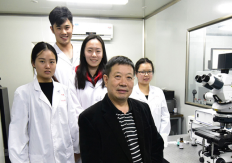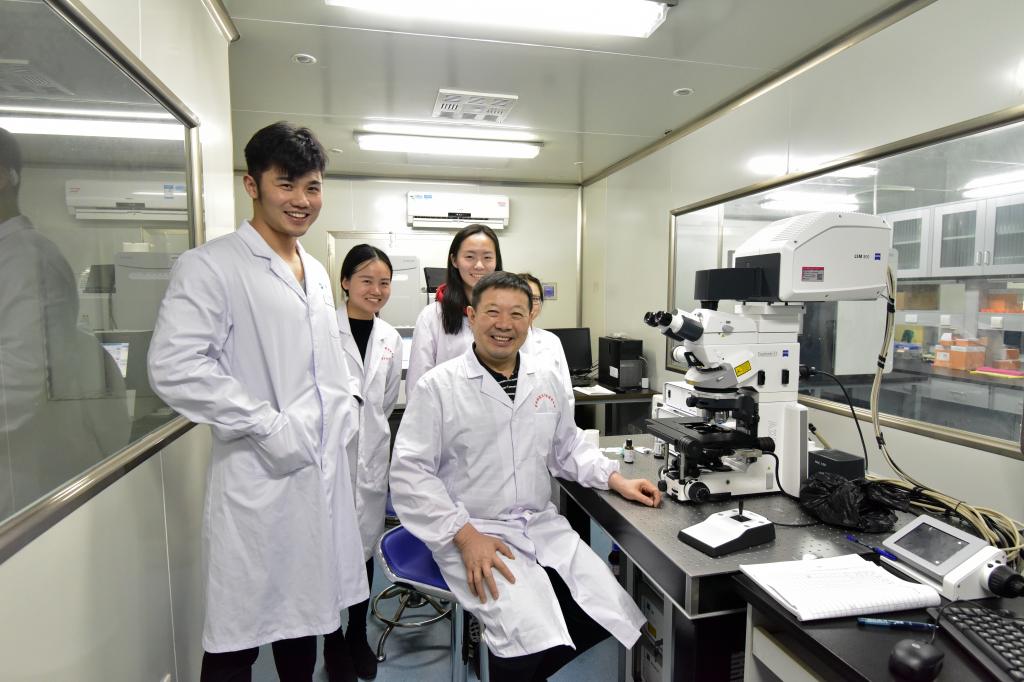----Neuroscience & Brain Diseases
A. Introduction of the Team
Team Leader: Prof. Dr. Lu Youming, dean of the TJMC School of Basic Medicine and director of Brain Research Center of HUST, acquired his Ph.D in neuroscience at the University of Toronto in 1998. After postdoctoral training at Columbia University, he was appointed to tenure-track assistant professor at University of Calgary, Canada,  followed by an endowed tenure full professor at Health Science Center, School of Medicine of Louisiana State University in 2008. Research interests focus on neuronal signaling processing and circuits in learning and memory, as well as major neurological disorders. He has received several major funds, including the National Natural Science Foundation Innovation Research Group and 4 major research projects from NSFC (Natural Science Foundation of China). He was awarded as Thousand Talents Program Professor and National Distinguished Experts in 2011.
followed by an endowed tenure full professor at Health Science Center, School of Medicine of Louisiana State University in 2008. Research interests focus on neuronal signaling processing and circuits in learning and memory, as well as major neurological disorders. He has received several major funds, including the National Natural Science Foundation Innovation Research Group and 4 major research projects from NSFC (Natural Science Foundation of China). He was awarded as Thousand Talents Program Professor and National Distinguished Experts in 2011.
Team Members:
Prof. Dr. ZHU Lingqiang, specialist in pathophysiology, scientist of 10,000 Talents Plan, winner of New Century Excellent Talents Program in Ministry of Education, in charge of science and technology innovation and entrepreneurship talent project and Joint platform for molecular biology of neuropathy between HUST and Toronto University, senior editor of Journal of Alzheimer’s Disease. His research focuses on prevention and treatment at early age of Alzheimer’s Disease and coordinated several projects funded by Natural Science Foundation of China.
 Prof. Dr. TIAN Qing, female, member of New Century Excellent Talents Project conducted by the Chinese Ministry of Education, research interests focus on the mechanism of cerebrovascular reconstruction, endoplasmic reticulum/golgi body stress with Neuronal injury. She has been in charge of several national natural science fundings and has published 20+ SCI research papers.
Prof. Dr. TIAN Qing, female, member of New Century Excellent Talents Project conducted by the Chinese Ministry of Education, research interests focus on the mechanism of cerebrovascular reconstruction, endoplasmic reticulum/golgi body stress with Neuronal injury. She has been in charge of several national natural science fundings and has published 20+ SCI research papers.
Prof. Dr. LIU Dan, female, Ph.D in pathophysiology, assistant professor, research interests focus on mechanism of synaptic diseases and neurogenesis of Alzheimer’s Disease. She has published 13 SCI research papers, including some authoritative journals such as Neuron, Biological Psychiatry, Molecular Psychiatry.
Prof. Dr. PEI Lei, Ph.D in neurobiology, 2-year visiting scholar at Dutch Royal Science Academy, focusing on the neurologic mechanism of neurological diseases, mainly in chronic pain and ischemia, in charge of several national and international fundings and published 13 SCI research paper and a reviewer of Frontiers in Molecular Neuroscience.
Dr. ZHU Houze, Ph.D in pathophysiology, lecturer, 8 SCI papers published as first author.
B. Main Research Areas
1. the cellular and molecular mechanisms underlying learning and memory. The major research interests are neuronal signaling processing and circuit that underlies learning memory.
2. Alzheimer’s Disease and its early symptom as memory loss on diverse research level including micro-RNA, proteomics and molecular signal pathways.
C. Background & Significance
With the development of single synaptic neuronal tracing and molecular imaging technology, scientists had begun to recognize that some neuronal circuit can be regulated for specific brain function. Single synaptic neuronal tracing could be used in a same species of neuron which has the same bio marker and shed light on the detail projection from those neurons or to those neurons. Combined with optogenetic technology, scientists will clarify the function of these neuronal circuits in the brain. However, neurons with unambiguous bio marker are a very small fraction compared to neurons in whole brain. The vast majority neurons are lack of specific bio marker based on the current knowledge. Structures and functions of neuronal circuit composed via those neurons still keeps unknown. Searching for the specific bio marker for those neurons and determining their functional circuits is a frontier question for life science.
At the same time, discovery of the brain’s advanced function and activities (storage of learning memory, formation of consciousness etc.) are the most advanced natural scientific questions in 21th century defined by the most influenced natural scientific magazine Nature. Therefore, finding specific bio markers for those “unidentified” neuron and determination of their specific neuronal circuit is not only important to uncover the cognition of whole brain neuronal circuit but also form a theoretical basis for treatment of human illness associated with memory loss, such as Alzheimer’s Disease Academic Strength (Talents, Laboratory Facilities & Equipment, Sample Size, Regional Coverage etc.)
D. Resources & Advantages
This team has an international-leading platform. Apart from the whole composition in traditional biochemistry lab, cell culture lab, behavior lab, and in vitro electrophysiology lab, optogenetic lab, it possesses some novel and precise instruments, namely 3 confocal microscopes (one for in vitro electrophysiology), cell soring and analytical flow cytometer, live cell workstation, digital imaging microscope, high resolution field microscope, Skinner’s behavior system etc.

E. Achievements & Publications
Since the establishment, this team has already obtained 20 national or international projects with sufficient funding, and published 100+ SCI research papers, including authoritative science journals as Neuron, Molecular Psychiatry, Nature Communications, Biological Psychiatry, Cerebral Cortex etc. It also developed undergraduate courses and textbooks, sponsored 3 international conferences on neurological disease and brain networks in 2012, 2014 and 2016.
Team Contact: Prof. TIAN Qing, tianq@hust.edu.cn
